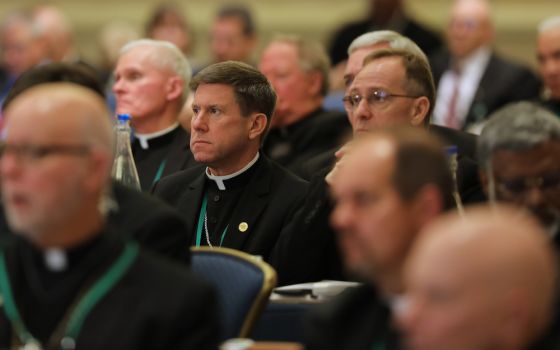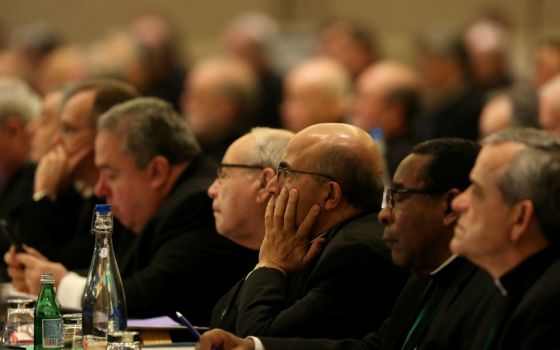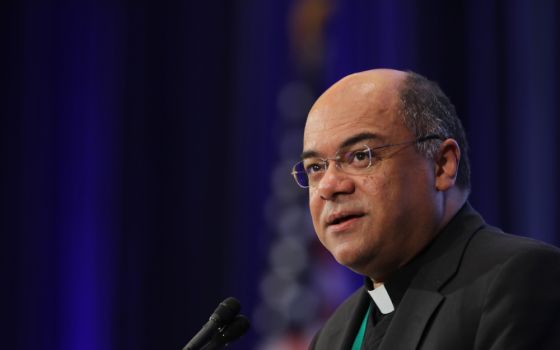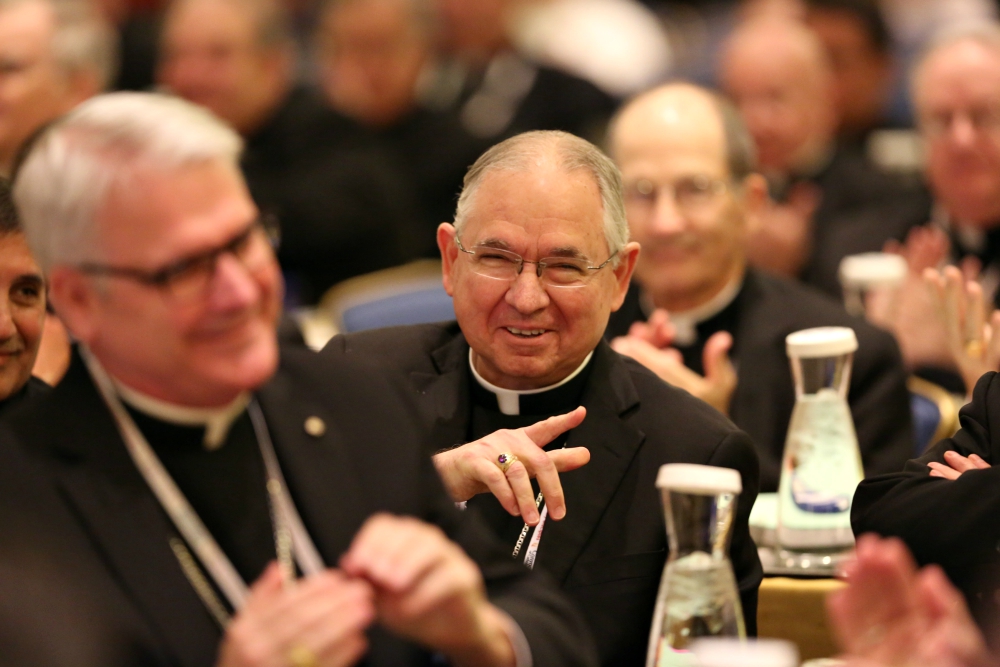
Archbishop José Gomez of Los Angeles smiles Nov. 15, 2016, after he was elected vice president of the U.S. Conference of Catholic Bishops during their annual fall general assembly in Baltimore. (CNS/Bob Roller)
If, as expected, the U.S. bishops elect Los Angeles Archbishop José Gomez as president of the U.S. Conference of Catholic Bishops at their November meeting in Baltimore, he would be the first Latino to head the episcopal body — and the first Opus Dei priest.
Although the latter may seem to signal business as usual from a national bishops' conference that has been decidedly right of center for decades, the former may be more significant for a country seeing a resurgence of overt racism and anti-immigrant fervor.
The election of a Latino could be a "prophetic sign," said Fr. Alejandro López-Cardinale, past president of La RED, a national network of Hispanic youth ministers.
"It would be a statement that everybody in this country is allowed to have opportunities and dreams and to achieve levels of leadership. It's not just for white people," said López-Cardinale, who has worked with Gomez for eight years.
Comparing the possibility of a Latino immigrant heading the conference to the election of Pope John Paul II as a symbol of unity between Eastern and Western Europe, López-Cardinale said Gomez could similarly "take down walls" between Mexico and the U.S., even as President Donald Trump is obsessed with erecting them.
Gomez, a native of Mexico, has served as vice president of the bishops' conference for the past three years. In nearly all cases, the bishops choose their previous vice president for the top office. They then elect a VP from the remaining nine of 10 nominated candidates — most of whom are conservatives, if not culture warriors, this year.
While Gomez is no liberal, some observers see him as a possible "bridge" that can begin to bring the U.S. bishops more in line with Pope Francis' emphasis on mercy and a ministry of accompaniment.
"He's not going to bring about radical change, but he would take us forward," said Jesuit Fr. Allan Figueroa Deck, a professor of theology and Latino studies at Loyola Marymount University in Los Angeles who has worked with Gomez for years.
Although theologically conservative, Gomez would not be a part of the resistance to Francis by some U.S. bishops, Deck believes.
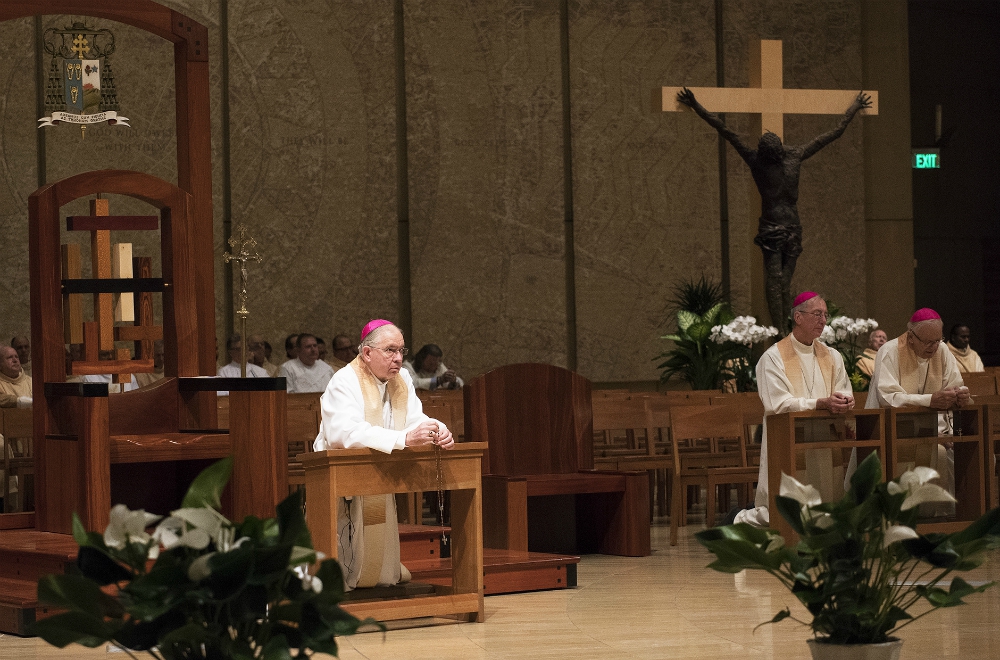
Archbishop José Gomez prays the rosary Sept. 18, 2018, at the Cathedral of Our Lady of the Angels before the 14th Annual Los Angeles Catholic Prayer Breakfast. (CNS/Angelus News/Victor Aleman)
As a leader, the 67-year-old prelate would instead reach out to different groups and "search for harmony" among various factions in the church, said Deck, who observed Gomez's leadership style when he was the first executive director of the bishops' Secretariat of Cultural Diversity in the Church, an office established under Gomez's direction.
At a time when the body of bishops is ideologically divided and "treading water," Gomez "would move the organization in a constructive direction," Deck said.
Gomez represents a growing demographic in the church: Latinos. Although a recent Pew survey saw a decline in Catholic identification among U.S. Hispanics, they still constitute a significant and increasing portion of the church (about 40%), since the decline in white Catholics is even steeper.
The LA archbishop also has become well-known in church circles for his statements in support of immigration and immigrants, including undocumented people.
Yet under Gomez, a number of conservative and some anti-Francis groups have expanded in the archdiocese, and the archbishop remains affiliated with some of those groups, including the Southern California-based Napa Institute.
Advertisement
His connection to Opus Dei also concerns more progressive Catholics. Given the extreme right slant of some in the church, Opus Dei is "almost in the center" now, as one observer told NCR. But Gomez's orthodox views and authoritarian leadership style concern many on the ground in Los Angeles, the largest diocese in the country.
Gomez declined to speak to NCR for this story.
Opus Dei and orthodoxy
Born in Monterrey, Mexico, Gomez joined Opus Dei while a college student. He was ordained a priest of Opus Dei in 1978 in Spain and he later served as one of its superiors, vicar of the delegation of Texas. When he was made an auxiliary bishop in Denver in 2001, Gomez became the first numerary (a celibate Opus Dei member who is dedicated full-time to the organization) to be named a bishop in the United States.
Opus Dei has been controversial because of its traditionalist theology as well as allegations of secrecy and cult-like practices. Founded by a Spanish priest in 1928, Opus Dei is now a "personal prelature" of the Vatican, which means its worldwide members are governed by Opus Dei's own bishop in Rome rather than by their regional bishop.
Once Gomez was made a bishop, however, he no longer reported to Opus Dei. He does not describe himself as a "member" of the organization, but rather says that his spirituality reflects that background. Opus Dei, which literally translates as "the work of God," emphasizes the sanctification and holiness of everyday work.
Gomez came to the United States in the late 1980s, and became a U.S. citizen in 1995. He has been involved in and led many Latino organizations, including the National Association of Hispanic Priests, the National Catholic Council of Hispanic Ministry, the Catholic Association of Latino Leaders, La RED (the National Catholic Network of Pastoral Juvenil Hispana) and the encuentro meetings and celebrations. He was named one of Time magazine's 25 most influential Hispanics in the U.S. in 2005 and a "notable Hispanic" by CNN in 2007.
In 2004, he was named archbishop of San Antonio, but his tenure there was not without controversy. He disbanded the archdiocesan Justice and Peace Commission over the issue of same-sex marriage, and criticized Catholic universities that hosted speakers who supported the ordination of women or pro-choice politics. He supported the expansion of the traditional Latin Mass.
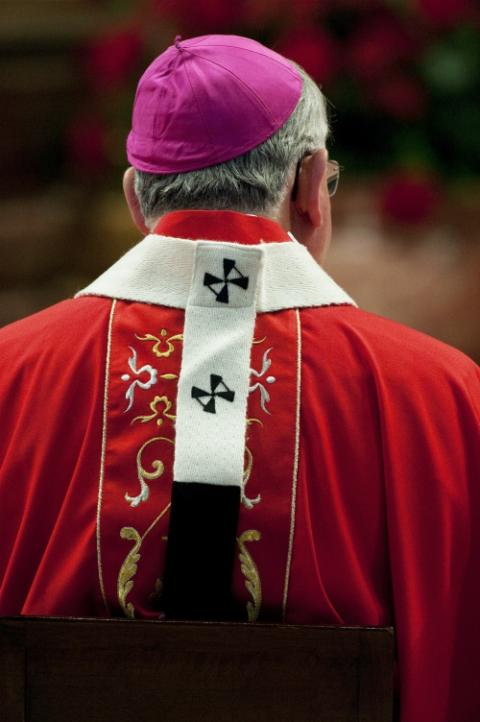
Archbishop José Gomez wears his woolen pallium during Mass in St. Peter's Basilica at the Vatican June 29, 2011. Pope Benedict XVI presented the pallium — a symbol of an archbishop's communion with the Holy Father — to 41 archbishops during the service. (CNS/Catholic Press Photo/Alessandro Serrano)
When he was named coadjutor for Los Angeles in 2010 and succeeded Cardinal Roger Mahony in 2011, some Southern California Catholics worried about similar changes with a more conservative leader. Those who communicated with NCR asked that their names not be used, as they feared for their jobs in church organizations or parishes.
Critics note the appearance and growth of more conservative organizations and ministries in the archdiocese (such as FOCUS or Endow, of which Gomez was a founding member), a loss of women in lay ecclesial ministries, the visibility of habited sisters, and a rise in clericalism among newer priests. Gomez's defenders say these trends are happening all across the country, not just in Los Angeles.
An authoritarian leadership style — in which Gomez consults only a few trusted advisers — is another criticism heard from people in the pews. Those who know him say he is rather shy.
At the 2010 press conference introducing him to the Los Angeles Archdiocese, Gomez's voice shook as he described his background. "This is getting a little emotional — forgive me," he said, taking a sip from a cup. "By the way, it's just water," he joked.
Critics also point to the disbanding of a social justice commission that was merged with the Respect Life Office shortly after Gomez arrived, and believe that the new Office of Life, Justice and Peace focuses more on anti-abortion advocacy than other life issues, including labor and the environment.
Immigration advocate
But there is one other "life" issue Gomez has been vocal about: immigration. In an age of Trump, that voice is especially critical, immigrants' advocates say.
Gomez's leadership on this issue is "prophetic and bold," said Cecilia González-Andrieu, associate professor at Loyola Marymount University, who praises the archbishop for "walking with" vulnerable immigrants.
"The community needs his voice to grow even stronger during the year that is coming, when surely Latino/a persons will be constantly targeted by Trumpism," she told NCR in an email interview.
González-Andrieu, who serves on the archbishop's theological commission, also praised Gomez's comments on clericalism at the national Encuentro meeting in Grapevine, Texas, last year, when he called "this moment in the church" the "hour of the laity," and his comments after the August mass shooting in El Paso, Texas, that targeted Mexican migrants.
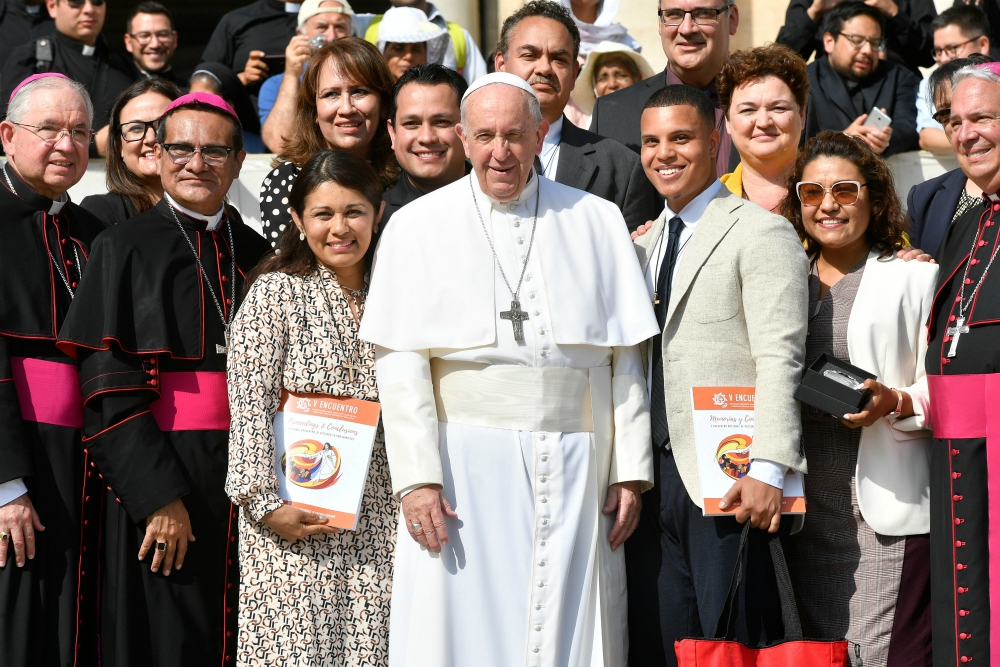
Pope Francis poses for a photo Sept. 18 with members of a U.S. delegation that traveled to Rome to present the results of V Encuentro at the Vatican. Los Angeles Archbishop José Gomez, leader of the delegation, is seen at the far left. Next to him is Detroit Auxiliary Bishop Arturo Cepeda and Paola Martinez of the Diocese of San Bernardino, California. To the right of the pope is Luis Pena of the New York Archdiocese, Junuee Castro of the Salt Lake City Diocese and Cleveland Bishop Nelson Perez. (CNS/Vatican Media)
Calling the shooting "personal," Gomez compared it to other "shameful episodes from our past," including the internment of Japanese-Americans during World War II, the bombing of churches in the Jim Crow South and the lynchings of Mexicans in Texas that continued into the 1920s.
White nationalism and domestic terrorism are nothing new, Gomez said in a column about the shooting in the archdiocesan newspaper, noting, "The myth that America was founded by and for white people is just that — a myth."
"The first language spoken in this continent was Spanish, not English," he said. "And this country has always been renewed, again and again, by successive waves of immigrants from every nation on earth."
Although Gomez is more outspoken than many U.S. bishops on this issue, some within and without the church believe the U.S. bishops as a whole have not been strong enough in their defense of migrants and refugees, especially children separated from their families at the border.
Although there have been statements, the bishops' conference has not organized a "March for Immigrants" like the anti-abortion "March for Life," nor a two-week campaign such as the "Fortnight for Freedom" for religious liberty. Some are hopeful that if Gomez is elected, immigration could become more of a priority.
López-Cardinale believes that while Gomez is a "man of few words," he is a "man of action."
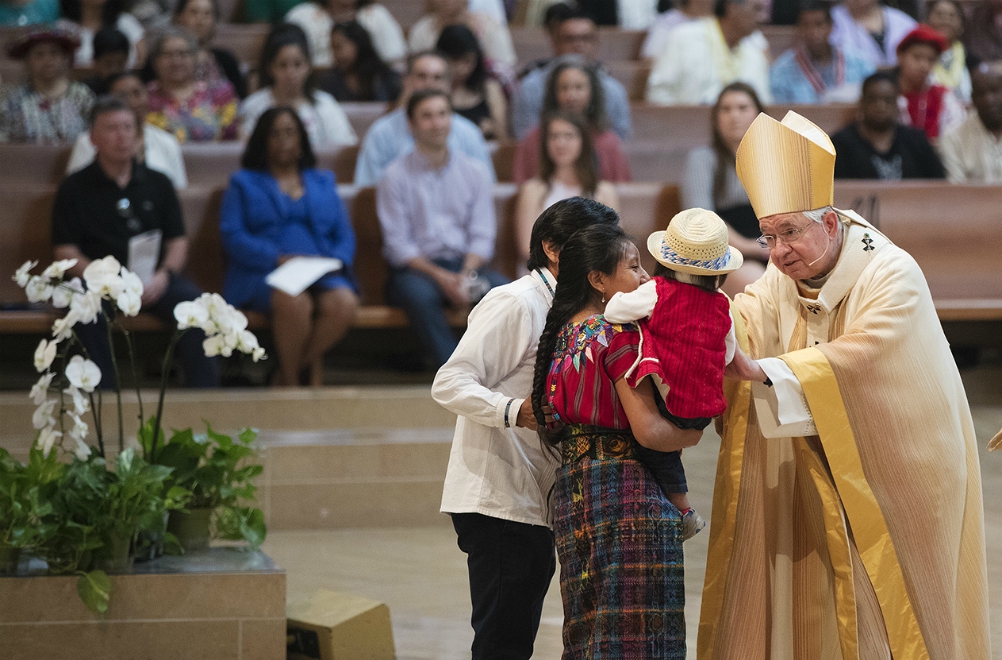
Archbishop José Gomez blesses a Mayan family from Guatemala during the presentation of the gifts at a June 18, 2017, Mass celebrated in recognition of all immigrants at the Cathedral of Our Lady of the Angels in Los Angeles. (CNS/Angelus News/Victor Aleman)
He points to Gomez's support of Catholic education, including the founding of the Centro de Juan Diego in Denver to serve Latino immigrants and provide pastoral education to lay Catholics.
"He has empowered laypeople to work, to dream and to move toward action," said López-Cardinale, who is now parochial administrator of St. Benedict Parish in Somerville, Massachusetts, and assistant director for Hispanic communities for the Boston Archdiocese.
Gomez's supporters also point to his appointment of Latinos to key positions in the archdiocese, including Verbum Dei Sr. Rosalia Meza to head the Office for Religious Education. Under Gomez, the Los Angeles Religious Education Congress also has continued to flourish, though admittedly with the addition of more traditional or conservative speakers.
In addition, Gomez has been appointed to serve on several Vatican commissions, as a consultant to the Pontifical Commission for Latin America, a member of the Special Council for America of the General Secretariat of the Synod of Bishops, and a member of the Pontifical Council for Social Communications. All three appointments were made by the former Pope Benedict XVI.
He also was a delegate to two synods called by Pope Francis, one on the family and the other on young people.
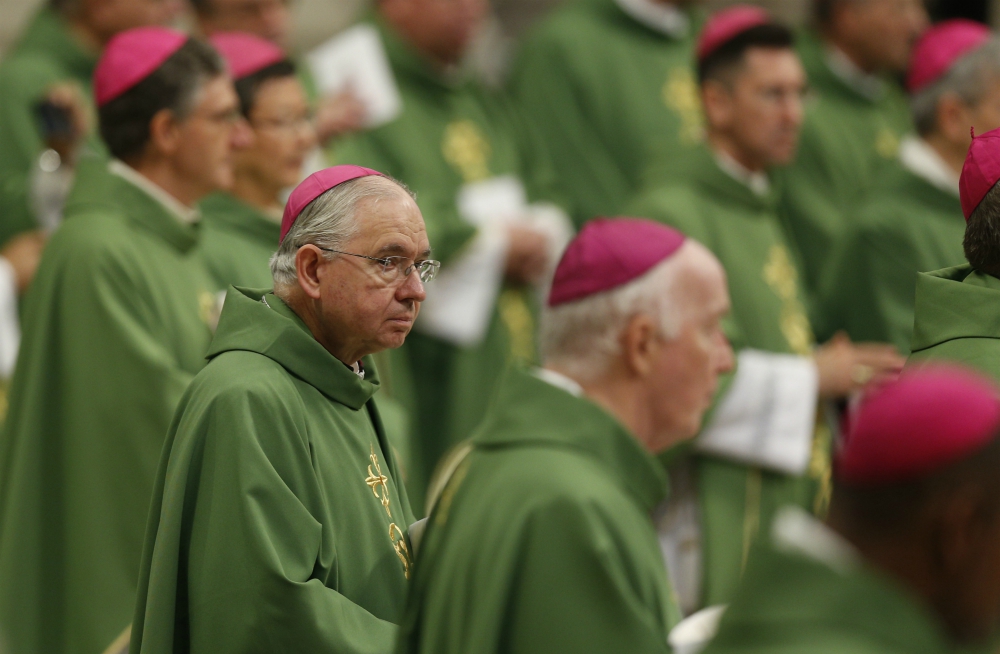
Archbishop José Gomez arrives for the closing Mass of the Synod of Bishops on young people in St. Peter's Basilica at the Vatican Oct. 28, 2018. (CNS/Paul Haring)
In the U.S. bishops' conference, Gomez has served on committees, subcommittees or task forces on migration, cultural diversity, doctrine, priestly formation, priestly life and ministry, the church in Latin America, Hispanics and the liturgy, and the Spanish-language Bible.
Leadership vacuum?
When the slate of candidates for president and vice president were released last month, more than a few commentators noticed they represented near uniformity of the ideological spectrum. NCR's Michael Sean Winters reported that several more progressive bishops declined to be nominated.
Of those on the slate for the two top offices, Archbishop Salvatore Cordileone of San Francisco, Bishop Thomas Paprocki of Springfield, Illinois; Bishop Kevin Rhoades of Fort Wayne-South Bend, Indiana; Archbishop Allen Vigneron of Detroit; and Archbishop Timothy Broglio of the Military Services are all right of center.
Bishop Frank Caggiano of Bridgeport, Connecticut; Bishop Daniel Flores of Brownsville, Texas; Archbishop Jerome Listecki of Milwaukee; and Archbishop Paul Coakley of Oklahoma City are seen by many as more moderate.
But a prospective candidate's theological views are not the only concern for Massimo Faggioli, professor of theology and religious studied at Villanova University in Philadelphia, who believes a strong leader is needed.
"They should elect a president who is not afraid off stepping on some toes and should not be afraid also on pushing back against Rome on some issues," such as the progress the U.S. bishops have made on sex abuse, Faggioli told NCR.
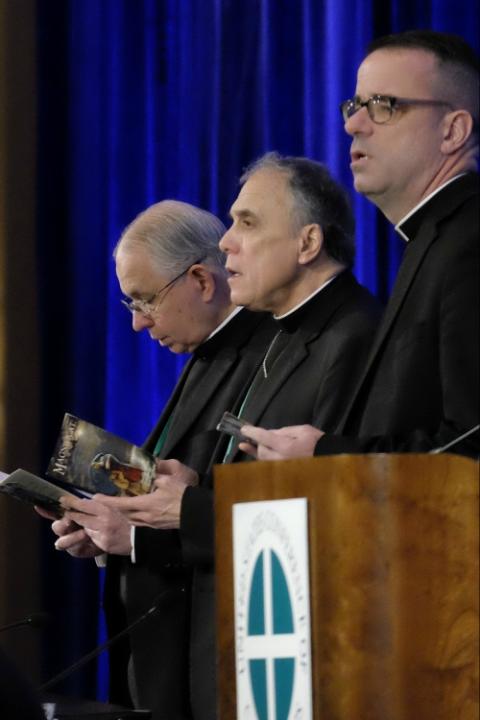
From left: Los Angeles Archbishop José Gomez, Galveston-Houston Cardinal Daniel DiNardo, and Msgr. J. Brian Bransfield, general secretary of the U.S. Conference of Catholic Bishops, take part in morning prayer during the U.S. bishops' fall meeting last year in Baltimore. (CNS/Tennessee Register/Rick Musacchio)
Outgoing president Cardinal Daniel DiNardo of Galveston-Houston has faced health problems as well as investigations about how sexual abuse has been handled in his diocese. This has, in effect, left the conference almost leaderless, Faggioli said.
Instead, the bishops' committees are often on the forefront of making statements about social issues, such as immigration, religious liberty or peace — which gives the impression of the conference as a "federation of committees" rather than a unified group, he said. The large size of the group — with 433 bishops — adds to this problem.
"In the end, the effect is that American Catholics do not know if their bishops have one voice on important things or not," Faggioli said.
If Gomez is elected, Faggioli said, "I really hope he starts saying what he thinks."
Some Hispanic observers note that Latino Catholics do not always fit into neat "left" or "right" ideological categories, especially when it comes to the church. Labels of "liberal" and conservative" may make more sense in a middle-class, European-American context.
"We don't place those categories on our reflection," said López-Cardinale. "What we will look at is how that person in front of us can connect faith and life. We look for mostly action, rather than ideas. Fighting over ideas is something Latinos don't have time for."
While Latinos may be socially conservative on some issues, they are more likely to be progressive about economic ones, Deck said, adding that Latinos moving into leadership in the church may be an opportunity to "get ourselves out of this rut of polarizing bifurcation."
Deck is hopeful that the possible election of a Latino to lead the bishops could be "a further moment in the transformation of American Catholicism."
"We're going to get leadership from Latinos in a significant way that we haven't before, or we're not going to get leadership," he said. "Otherwise, we have a very crippled, dysfunctional church. This is a moment to step up. Latinos have to step up."
[Heidi Schlumpf is NCR national correspondent. Her email address is hschlumpf@ncronline.org. Follow her on Twitter @HeidiSchlumpf.]





